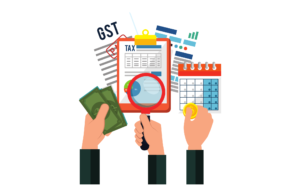Launch GST & VAT Filing Consulting Business
Establishing a GST (Goods and Services Tax) and VAT (Value Added Tax) Filing Consulting Business is an excellent opportunity to apply your tax compliance expertise while fulfilling a vital need for businesses across various industries. As tax regulations continually evolve, businesses—especially SMEs—often require experienced consultants to manage compliance, optimize tax strategies, and mitigate penalties.
In this blog, we’ll explore the essentials of launching a GST and VAT Filing Consulting Business, including the types of services you can offer, foundational steps, and strategies for building a solid client base.
1. Understanding the Role of a GST & VAT Consultant

As a GST & VAT consultant, you play a vital role in supporting businesses by providing guidance in tax planning, accurate filing, and compliance with both national and international tax laws. By offering specialized services, you enable your clients to manage their tax obligations effectively, avoid costly errors, and navigate the often-complex tax environment. Your expertise helps companies stay updated with tax regulations, reducing the risk of penalties and ensuring smooth operations.
For those exploring how to start a GST and VAT Filing Consulting business, understanding the scope of this role is essential. Consultants typically assist with tax registrations, regular filings, audits, and optimization strategies to make sure businesses leverage available tax credits and deductions.
Key Services You Might Offer:
- GST and VAT Registration: Helping businesses register and obtain necessary certifications.
- Regular Tax Filings: Ensuring timely, accurate submissions to avoid penalties.
- Tax Planning and Compliance Audits: Advising clients on tax strategies and conducting audits to ensure adherence to tax laws.
- Input Tax Credit Optimization: Assisting businesses in maximizing eligible credits.
- Audit Support and Penalty Mitigation: Representing clients in audits and offering guidance to reduce potential penalties.
- Industry-Specific Guidance: Providing customized advice for sectors with unique tax obligations, such as e-commerce and retail.
Also Read:- How to Start a Virtual CFO Services Business: in 9 Easy Steps
2. Building the Right Skill Set and Qualifications
A strong foundation in tax law, finance, or accounting is essential to succeed in a GST and VAT Filing Consulting Business. Having a degree in finance, accounting, or law helps build the necessary knowledge base, and earning specific certifications in GST and VAT compliance enhances your credibility in this specialized field. For example, certifications such as the GST Practitioner Certification or VAT Compliance Certification equip you with the practical skills required for accurate tax filing and compliance, which are critical in this line of work.
addition to formal education, practical experience in handling GST and VAT filings is highly valuable. This hands-on experience sharpens your understanding of the filing process, tax planning, and compliance needs across different industries. As tax regulations frequently change, it’s crucial to commit to ongoing education by attending workshops, webinars, and training programs focused on GST and VAT updates.
Furthermore, becoming proficient in tax software like Tally, QuickBooks, or other industry-specific tools will streamline your work and help your GST & VAT Filing Consulting Business run more efficiently.
Recommended Skills and Certifications:
- Educational Background: Bachelor’s degree in finance, accounting, or law.
- Professional Certifications: Courses such as GST Practitioner Certification, VAT Compliance Certification, or CPA.
- Tax Software Proficiency: Familiarity with software like Tally, QuickBooks, or specialized GST/VAT tools.
- Analytical Skills: Important for tax planning, compliance audits, and optimization strategies.
- Attention to Detail: Essential for accurate filings and compliance to minimize risk of errors.
Also Read: How to Start a Handcrafted Jewelry Business in 2024
3. Conducting Market Research and Finding Your Niche

Market research is a crucial step for anyone looking to launch a successful GST and VAT Filing Consulting Business. By thoroughly analyzing the tax consulting landscape, you can determine the demand for your services and uncover specific client needs. Researching market trends helps you identify gaps in existing services, allowing you to define a unique niche that sets your business apart from competitors. This approach not only makes your business more competitive but also helps you tailor services to specific client requirements, whether for SMEs, large corporations, or specialized sectors like e-commerce and manufacturing.
Identifying your niche can make a significant difference in building a loyal client base. For instance, some clients may require comprehensive tax advisory services, while others need ongoing filing support or assistance with compliance audits.
Steps for Market Research:
- Identify Target Industries: Focus on industries like e-commerce, real estate, and retail that have more complex tax requirements.
- Analyze Competitors: Look at existing consulting firms’ services and pricing to identify gaps you could fill, like offering specialized audit support or international VAT compliance.
- Define Your Niche: Decide if you’ll work primarily with SMEs, large corporations, or specific industries. This will allow you to tailor your marketing efforts more effectively.
Talk to our expert Business Consultant. Click Here To Book Your Appointment
4. Creating a Comprehensive Business Plan
A clear business plan is essential for setting goals, organizing services, and planning for profitability in your GST & VAT Filing Consulting Business. It will serve as a roadmap for your consulting business, helping you define your mission, vision, and long-term objectives. This document will also guide your decisions as you navigate the challenges and opportunities of the tax consulting industry, ensuring that you stay on track and focused on your growth.
Moreover, financial projections are a key component of your plan. You should estimate your startup costs, expected revenue, and pricing models, ensuring that your GST & VAT Filing Consulting Business is financially viable. Include a strategy for scaling your business as demand grows, such as expanding your service offerings or hiring additional staff.
A well-structured business plan not only helps you manage day-to-day operations effectively but also increases your chances of securing funding or partnerships, if necessary. By creating a solid business plan, you’ll lay a strong foundation for a sustainable and successful consulting business.
Key Elements of Your Business Plan:
- Mission and Vision: Define your goals and the unique value your consulting business will offer.
- Service Offerings: Specify your services, such as regular filings, audits, and tax strategy consulting.
- Market Analysis: Outline your target audience, industry trends, and competitor insights.
- Operational Plan: Detail your process for client onboarding, filing, and compliance tracking.
- Financial Projections: Estimate startup costs, projected revenue, pricing models, and expected profitability.
Also Read:- How to Start a Study Abroad Consulting Business
5. Registering Your Business and Meeting Legal Requirements

Legal registration and compliance are essential steps before launching your GST & VAT Filing Consulting Business. Registering your business ensures that you operate within the legal framework and protects you from potential legal liabilities. In addition to establishing your business as a legitimate entity, this process helps build trust and credibility with your clients, who will feel more confident knowing that you adhere to local laws and regulations.
Steps for Legal Setup:
- Choose a Business Structure: Select the best structure, like a sole proprietorship, partnership, or LLC, depending on your preferences and risk tolerance.
- Register Your Business Name: Choose a professional business name and register it with your local authorities.
- Obtain Licenses/Certifications: Check if you need any specific licenses to operate as a tax consultant.
- Get Professional Liability Insurance: This insurance protects you against claims of negligence or errors, particularly if you’re handling sensitive financial data.
Also Read:-How to Start a Corporate Training Business
6. Setting Up Your Office and Technology Tools
Setting up a functional office is a key step in establishing your GST & VAT Filing Consulting Business. Whether you choose to operate from a home office or lease a commercial space, it’s crucial to create a professional, organized environment that enhances productivity and client trust. A well-designed workspace allows you to focus on your work and ensures that your clients perceive you as a credible and efficient consultant.
For your GST & VAT Filing Consulting Business, having the right technology tools is essential to streamline your operations and provide high-quality service. Begin by investing in accounting and tax software tailored to GST and VAT compliance. Tools such as QuickBooks, Tally, or specialized GST/VAT filing software can help automate calculations, manage client data, and ensure timely filing. These tools not only save time but also reduce the likelihood of errors, making them an essential part of your business setup.
Essential Tools:
- Tax and Accounting Software: Use tools like QuickBooks or Tally to automate filings and manage accounts.
- CRM Software: To organize client interactions, track deadlines, and manage inquiries.
- Document Management System: Store sensitive client records securely with a reliable document management system.
- Professional Office Setup: If working from home, designate a quiet, professional space for client calls and meetings.
Also Read:– How to Start Cloud Kitchen
7. Pricing Your Services and Setting Up a Billing System

Accurate pricing is one of the most important aspects of running a successful GST & VAT Filing Consulting Business. Setting the right price point not only attracts clients but also ensures that your business remains profitable. When determining your pricing strategy, it’s essential to consider the complexity of the services you offer and the value you provide to your clients. A well-thought-out pricing model will help you position your services competitively while maintaining profitability.
You may also consider pricing your services on an hourly or flat-rate basis. An hourly rate is ideal for consulting services where the time and complexity of the job vary. For instance, in-depth consultations and audits may require more hours, which justifies higher hourly rates.
Setting up an efficient billing system is equally important for maintaining smooth operations. Use accounting software or a dedicated invoicing tool to track payments, issue invoices, and maintain financial records for your GST & VAT Filing Consulting Business.
Pricing Tips:
- Research Competitor Rates: Understand local pricing trends for similar services.
- Offer Tiered Packages: Create service tiers such as “Basic” for standard filings and “Premium” for full consulting and audit services.
- Value-Based Pricing: For complex services, price based on the impact of your work, like tax savings or penalty avoidance.
- Billing System: Use software with invoicing capabilities, such as accounting software with integrated billing, to manage client payments.
Also Read:- How to Start Online Health Consultation Business
8. Marketing Your GST & VAT Consulting Business
A strong marketing strategy is essential to attracting clients and establishing a reputation in the competitive field of GST & VAT Filing Consulting Business. Your goal should be to build credibility, promote your expertise, and connect with businesses that need assistance with compliance, tax planning, and filing. By crafting a comprehensive marketing plan, you can effectively reach your target audience and showcase the value your services bring.
tart by building an online presence, as most businesses and entrepreneurs search for services like yours online. Create a professional website that highlights your services, experience, and client testimonials. A well-designed website acts as a virtual office and serves as a key touchpoint for potential clients. Include details such as your offerings for GST & VAT Filing Consulting Business, the value you provide, and why clients should trust your services over competitors.
Be sure to optimize your website for search engines (SEO) by using relevant keywords like “GST & VAT Filing Consulting Business” to ensure it ranks well on search results.
Marketing Strategies to Consider:
- Build a Professional Website: Include your services, case studies, and a blog for SEO. Topics like “Common GST Filing Mistakes” can attract traffic and boost visibility. Consider hiring a professional website development company to ensure your online presence is both functional and optimized for SEO.
- Leverage Social Media: Share industry updates and insights on LinkedIn, Twitter, and Facebook to reach business owners. Consider hiring a social media marketing company to professionally manage your online presence and maximize engagement.
- Network with Accounting Firms: Build partnerships with local firms that can refer clients needing specialized tax support.
- Host Workshops or Webinars: Educate small business owners on GST and VAT basics to establish authority and attract potential clients.
9. Building and Managing Client Relationships
Maintaining strong client relationships is a cornerstone of success in your GST & VAT Filing Consulting Business. Client retention is often more cost-effective than constantly acquiring new clients, so it’s important to build long-lasting relationships based on trust, reliability, and excellent service. When clients feel confident that their tax and compliance needs are in capable hands, they are more likely to continue working with you and refer your services to others.
One of the key factors in building these strong relationships is offering personalized and proactive service. Each business has its unique set of challenges and requirements when it comes to GST and VAT compliance. Take the time to understand your client’s business model, industry-specific needs, and any unique tax concerns they may have.
Another important aspect of managing client relationships in your GST & VAT Filing Consulting Business is being transparent and accessible. If any issues arise with a client’s filings or taxes, address them promptly and provide clear explanations of the situation.
Strategies for Client Retention:
- Clear Communication: Regularly update clients on filing deadlines, regulation changes, and compliance updates.
- Provide Regular Reviews: Offer quarterly reviews to help clients stay on track with tax requirements.
- Collect Feedback: Regularly seek feedback to improve services and show commitment to quality.
Conclusion
Starting a GST & VAT Filing Consulting Business offers you the exciting opportunity to become a key player in helping businesses navigate the complexities of tax compliance. In a world where tax regulations are constantly evolving, your expertise can save businesses from costly mistakes and ensure smooth filing processes. By offering your guidance, you help businesses stay ahead of the curve and avoid potential penalties.
With a strong foundation in tax law, clear service offerings, and a strategic marketing approach, you can position your consulting firm as the go-to partner for businesses seeking to simplify their tax obligations. Your knowledge and support will be invaluable for clients looking for efficient solutions to manage their GST & VAT requirements.
By following this guide, you’ll not only lay a solid foundation for your GST & VAT Filing Consulting Business but also create a brand that businesses trust and rely on. Whether you’re advising small startups or established corporations, your ability to provide value through proactive solutions, tailored strategies, and reliable support will set you apart in a competitive market.
Want to attract more clients to your consulting firm? Explore powerful Digital Marketing Strategies for GST & VAT Filing Consultants to boost your visibility and grow your business.












![[object Object]](/_next/image?url=https%3A%2F%2Fcms.msmestory.com%2Fwp-content%2Fuploads%2F2026%2F01%2FInnerwear-Manufacturing.png&w=3840&q=75)
![[object Object]](/_next/image?url=https%3A%2F%2Fcms.msmestory.com%2Fwp-content%2Fuploads%2F2026%2F01%2FSaree-Manufacturing.png&w=3840&q=75)
![[object Object]](/_next/image?url=https%3A%2F%2Fcms.msmestory.com%2Fwp-content%2Fuploads%2F2026%2F01%2FDupatta-Manufacturing.png&w=3840&q=75)
![[object Object]](/_next/image?url=https%3A%2F%2Fcms.msmestory.com%2Fwp-content%2Fuploads%2F2026%2F01%2FLeggings-Manufacturing.png&w=3840&q=75)
![[object Object]](/_next/image?url=https%3A%2F%2Fcms.msmestory.com%2Fwp-content%2Fuploads%2F2026%2F01%2FSeasonal-Gift-Hampers-Manufacturing.png&w=3840&q=75)
![[object Object]](/_next/image?url=https%3A%2F%2Fcms.msmestory.com%2Fwp-content%2Fuploads%2F2026%2F01%2FRakhi-Manufacturing.png&w=3840&q=75)
![[object Object]](/_next/image?url=https%3A%2F%2Fcms.msmestory.com%2Fwp-content%2Fuploads%2F2026%2F01%2FLeather-Gift-Items-wallets-keychains-Manufacturing.png&w=3840&q=75)
![[object Object]](/_next/image?url=https%3A%2F%2Fcms.msmestory.com%2Fwp-content%2Fuploads%2F2026%2F01%2FJute-Bags-Manufacturing.png&w=3840&q=75)
![[object Object]](/_next/image?url=https%3A%2F%2Fcms.msmestory.com%2Fwp-content%2Fuploads%2F2026%2F01%2FBamboo-Crafts-Manufacturing.png&w=3840&q=75)
![[object Object]](/_next/image?url=https%3A%2F%2Fcms.msmestory.com%2Fwp-content%2Fuploads%2F2026%2F01%2FTerracotta-Clay-Product-Manufacturing.png&w=3840&q=75)
![[object Object]](/_next/image?url=https%3A%2F%2Fcms.msmestory.com%2Fwp-content%2Fuploads%2F2026%2F01%2FHandmade-Jewellery-Manufacturing.png&w=3840&q=75)
![[object Object]](/_next/image?url=https%3A%2F%2Fcms.msmestory.com%2Fwp-content%2Fuploads%2F2026%2F01%2FWooden-Gift-Items-Manufacturing-2.png&w=3840&q=75)
![[object Object]](/_next/image?url=https%3A%2F%2Fcms.msmestory.com%2Fwp-content%2Fuploads%2F2026%2F01%2FGreeting-Cards-Printed-Gifts-Manufacturing.png&w=3840&q=75)
![[object Object]](/_next/image?url=https%3A%2F%2Fcms.msmestory.com%2Fwp-content%2Fuploads%2F2026%2F01%2FCustomized-Gifts-Manufacturing.png&w=3840&q=75)
![[object Object]](/_next/image?url=https%3A%2F%2Fcms.msmestory.com%2Fwp-content%2Fuploads%2F2026%2F01%2FResin-Art-Products-Manufacturing.png&w=3840&q=75)
![[object Object]](/_next/image?url=https%3A%2F%2Fcms.msmestory.com%2Fwp-content%2Fuploads%2F2026%2F01%2FHandmade-Candles-Manufacturing.png&w=3840&q=75)
![[object Object]](/_next/image?url=https%3A%2F%2Fcms.msmestory.com%2Fwp-content%2Fuploads%2F2026%2F01%2FSpiritual-Accessories-Rudraksha-Malas-Manufacturing.png&w=3840&q=75)
![[object Object]](/_next/image?url=https%3A%2F%2Fcms.msmestory.com%2Fwp-content%2Fuploads%2F2026%2F01%2FAromatherapy-Oils-Manufacturing.png&w=3840&q=75)
![[object Object]](/_next/image?url=https%3A%2F%2Fcms.msmestory.com%2Fwp-content%2Fuploads%2F2026%2F01%2FDecorative-Candles-Manufacturing.png&w=3840&q=75)
![[object Object]](/_next/image?url=https%3A%2F%2Fcms.msmestory.com%2Fwp-content%2Fuploads%2F2026%2F01%2FDiya-ClayMetal-Manufacturing.png&w=3840&q=75)

